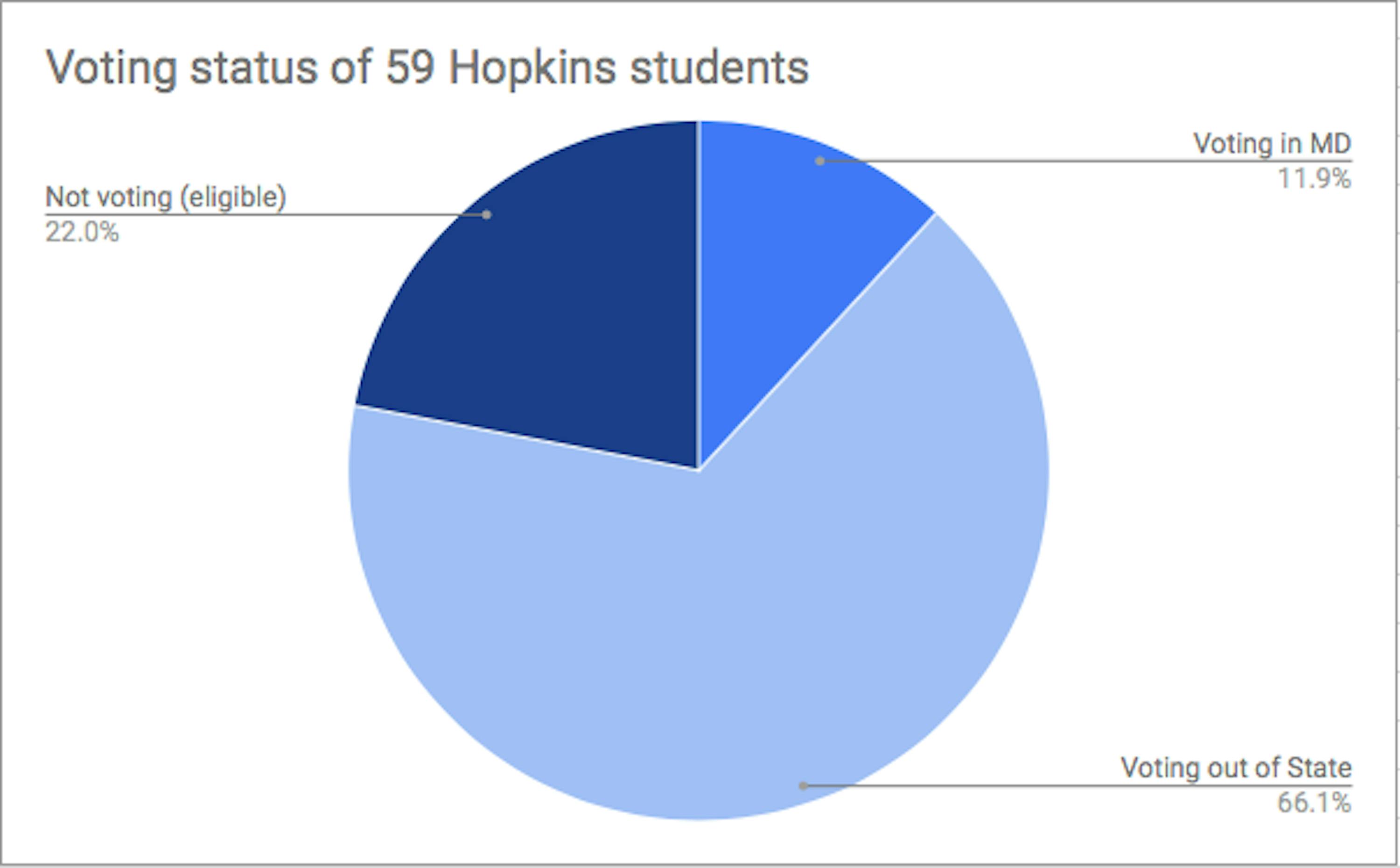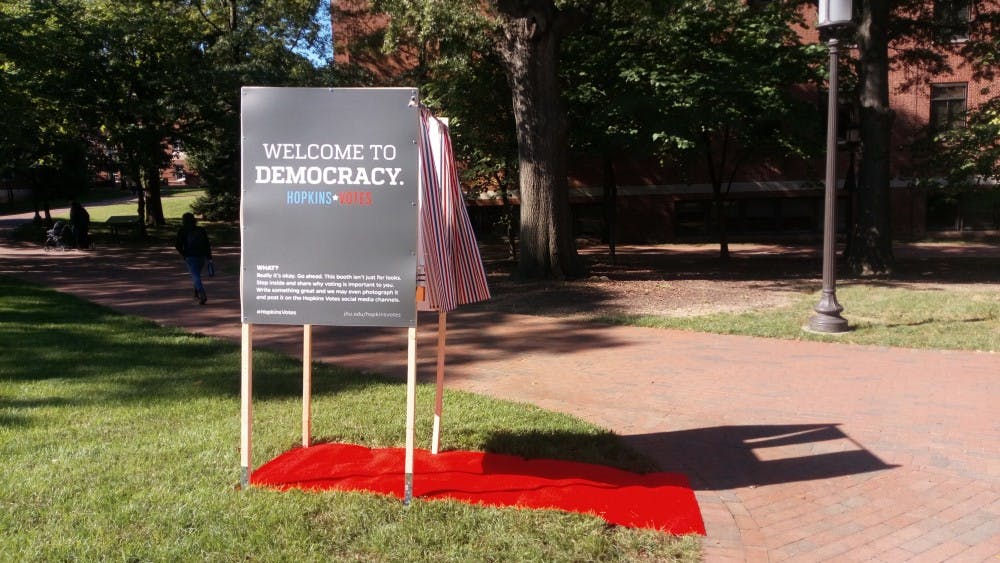The upcoming 2018 midterm elections will determine which political party will control Congress for the next two years. Since one-third of seats in the Senate and all 435 seats in the House of Representatives are up for election, many students are preparing to cast their ballots.
On campus, student and University organizations have collaborated on numerous events to increase student voter turnout for the Nov. 6 election. These organizations, such as the Student Government Association (SGA), the Center for Social Concern (CSC) and Inform Discuss Enlighten Acknowledge Learn (IDEAL), have encouraged students to use TurboVote, an online service that allows students to more easily register to vote.
Misti McKeehen, CSC executive director, explained that the University is taking a non-partisan approach to encouraging and aiding student voters.
“It’s not about who you’re going to cast your ballot for,” McKeehen said. “It really is about making sure you’re exercising your right to vote and understanding how the issues affect you.”
McKeehen explained that while many students register to vote and request absentee ballots, they may not ultimately cast their ballot because they are unable to obtain a stamp. However, she stated that because of donations from the Hopkins Parents Fund, the CSC is able to provide a free envelope and stamp to student voters who want to submit their absentee ballots.
“My hope is that as we continue to grow the Hopkins voting initiative, that this will just be in the fabric,” McKeehen said. “So anytime a student comes to Hopkins they know that this is part of our culture here on campus — that we are engaged citizens, and we’re not just living in a Hopkins bubble.”
Sophomore Class President Sam Schatmeyer praised the work that students have done in creating a campus community that encourages students to vote, especially by walking them through the voting process.
He explained that many freshmen and sophomores have never voted before and may have difficulty understanding absentee ballots.
“All elections, but especially [the Midterm Elections], are too important to sit out and I think that that’s the prevailing sentiment on campus,” Schatmeyer said.
Schatmeyer stated that the issues currently up for debate during the Midterm Elections are extremely relevant to young people. He listed issues such as climate change, prison reform, health care and tax policies as some of the issues that will have long-lasting impacts.
According to Schatmeyer, the current presidential administration is operating in a way that is steeped in fearmongering.
“The right has done a scary job of riling up their base with fear of immigrants, fear of immigrant crime and this notion that white male privilege is being taken away,” Schatmeyer said. “The fact that they’re using the Kavanaugh hearing to whip up their base is disgusting.”
He explained that while voting is not the only thing that students can do to be politically active, it is the most accessible and lasting thing students can do to impact the political climate.
According to the National Student Leadership and Voter Education report, only 14.4 percent of Hopkins students voted in the 2014 midterm elections. At the time over 65 percent of the student body was eligible to vote.
According to the Pew Research Center, while those who are aged 53 and younger are the clear majority of voters and more likely to lean Democratic, they are the least likely to cast their ballots.
The News-Letter spoke to 59 students about their plans to vote in the midterms. Of registered students interviewed, 78 percent are planning to vote while 22 percent are not.
Of students who are planning on voting, most are planning on voting out of state at 66.1 percent. 11.9 percent of students interviewed plan on voting within Maryland during the election.
Various student-run organizations across campus have also orchestrated voter registration drives in hopes of fostering a more prevalent voting community. The Korean-American Student Association (KASA) and Vietnamese Student Association (VSA) co-hosted a voter registration drive on Oct. 12.
Co-President of KASA Aran Jang explained that the organizations hosted the drive in collaboration with the Korean-American Grassroots Conference (KAGC), a political organization that encourages Korean-American college organizations to promote Asian-American voting.
“The reason we feel that a lot of policies were made without [Asian Americans] in mind is because we never vote,” he said. “We never make our voices heard to change these policies.”
According to Jang, the drive had over 50 participants. However, he said that while most people were already registered to vote, or willing to sign up, Asian-American students were less likely to participate in comparison to other demographics.

He stated that given discussions with other Korean-American organizations at campuses such as Yale and Cornell, he believes that a lack of Asian-American student voters is a common trend.
Jang explained that a lot of people believe that their votes do not factor significantly into the outcome of elections. He believes that this same sentiment impacted the outcome of the 2016 presidential elections, when people did not vote because they were confident that Hillary Clinton would win.
According to Jang, the Inter-Asian Council (IAC) has been hosting monthly conversations in an effort to incorporate Asian-American participation in community issues, including voting.
However, Jang believes that the University can further promote student voting by publicizing voter registration events, in addition to encouraging more student organizations to host on-campus voter registration drives.
“Hopkins, considering how much money it has and how much power it has, can definitely do more,” Jang said.
Sophomore Charlie Nguyen, a member of VSA, agrees that there needs to be a larger push in voter registration efforts. Nguyen praises the efforts of students who host events but believes that it would have been more effective to foster collaboration between a diverse group of student-run organizations.
“Many of the cultural and diversity organizations here on campus are comprised of populations of students who are less likely to vote — for example, Asian-American culture groups — yet have great power in terms of their reach,” Nguyen said. “Our campus community as a whole should definitely try to leverage that looking into the future.”
“I feel like being surrounded by a network of friends who are more politically or civically engaged puts me in sort of a bubble,” Nguyen said. “While in reality, there were actually a lot of people who probably weren’t as passionate about voting.”
Nguyen believes that more students are becoming aware of the importance of voting, especially with how political decisions are reported in the news and spread on social media. He hopes to see an increase in voter participation among fellow students in the upcoming elections.
Sophomore Lyle Carrera appreciates the work that organizations across campus have done to increase voter registration and turnout. However, according to Carrera, the general sentiment on campus is that students either care or do not about voting, with no in-between.
“You don’t get to complain if you don’t vote,” Carrera said. “It’s useless for you to complain about everything that our government is doing or politicians are doing later. The only time when your complaints or your issues can have an actual tangible impact is in the ballot box.”
According to Carrera, the current political climate has demonstrated that there is a wide range of ideas and provisions for the future of the country that people want enacted.
“If politicians don’t have their finger on the pulse of the people, they just won’t do anything,” Carrera said. “The best way to tell Washington or your State House or your local city governor what you want is to vote on ballot propositions and for candidates.”





